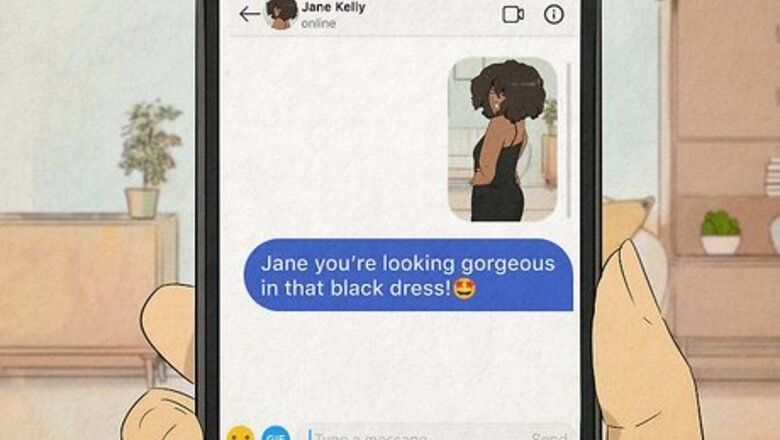
views
Comment on the person's posts before messaging them.
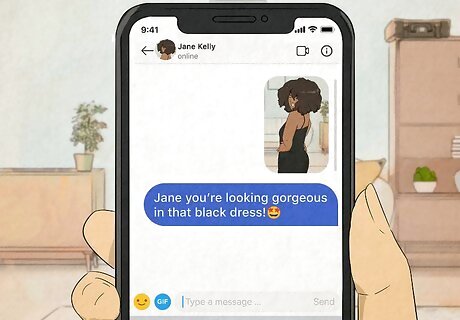
A DM will be more welcome if the person recognizes you. If you've been following the person on social media for a while, make your presence known by occasionally commenting on their posts. And this doesn't mean dropping a flame emoji in the comments on a bikini pic! Have something kind and supportive to say that shows you appreciate them and the two of you have something in common. It can take some time to build up a rapport with someone, especially if they have a pretty large following and get a lot of comments on their posts. Just have patience. Digging through their profile and liking or commenting on every post going back a year or two is going to come across as super creepy, so don't do that. Stick to current posts and comment as they happen.
Introduce yourself and explain how you found them.
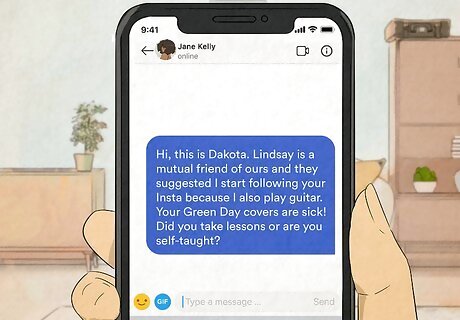
Start with your name and put yourself in context. If you know the person through someone else, you might mention that person. Otherwise, tell them briefly how you found their account. This will help your message seem less random, which means they'll be more likely to respond. Keep it light and brief so it's easy for them to dash off a response quickly. For example, you might say, "Hi, this is Dakota (they/their). Lindsay is a mutual friend of ours and they suggested I start following your Insta because I also play guitar. Your Green Day covers are sick! Did you take lessons or are you self-taught?" You could also mention a particular town or school. For example, you might say, "Hi, I'm Caleb (he/him). I saw that you're an engineering major at NC State. I'm interested in that program so I thought we might connect. What other schools did you look at?" If they really are a complete stranger, don't shy away from that fact. For example, you might say, "Hi, I'm Leslie (she/her). I stumbled on your profile a couple of months ago and I've been following ever since. Your coffee art is so impressive! I just thought I'd take the time to introduce myself. Have you been a barista for long?"
Ask a question about the person's interests.

Questions help the person feel you're genuinely interested in them. Figure out what the person's interested in through their profile or the things they post about. If you don't have a more specific question, you might start by simply asking how they got into that thing or what their favorite thing about it is. For example, you might say, "I'm so inspired by your up-cycling projects. What kind of paint do you use for furniture?" If you're going to ask a question about a specific post, it's usually better to comment directly on the post rather than send a DM. But it's fine to DM with a question about several posts. For example, you might say, "I've noticed you post a lot of Green Day covers. Are they your favorite band? What's your favorite album of theirs?" You can also ask their opinion about recent news that's related to their interests. For example, you might say, "I know you do a lot of Green Day covers. Have you heard about their new single coming out?"
Tell the person you'd like their advice on something.

People are often more likely to respond to requests for their expertise. Everyone likes to feel as though their thoughts on something are important. When you ask someone for advice, you're telling them that you consider them something of an authority on whatever you're asking them about—and that's definitely a compliment. Just tie your advice into something you know the person is good at or knowledgeable about. For example, you might say, "I've been canning for a while now but it's so hard to find supplies. Where do you get all your cute little jars?" If you're just getting started in something they're proficient at, you might ask them how to get started. For example, you might say, "I just started learning to play guitar. Is it better to keep practicing scales and chords or can I jump right into playing songs?"
Pay the person a sincere compliment.
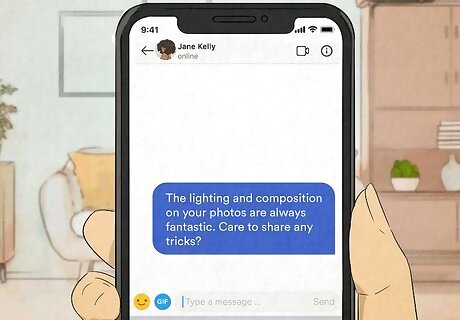
Compliment their skills or activities rather than their looks. Everyone loves a compliment and it shows the person that you like them and are interested in them. Following up your compliment with a question really seals the deal—after all, you don't ask someone questions if you're not interested in them. For example, you might say, "When I watch you play, it's like the guitar is an extension of your body. How long have you been playing? Did you take lessons or are you self-taught?" If the post themselves highlight a particular skill, you might also compliment them on that. For example, you might say, "The lighting and composition on your photos are always fantastic. Care to share any tricks?"
Add humor to your messages with GIFs and memes.
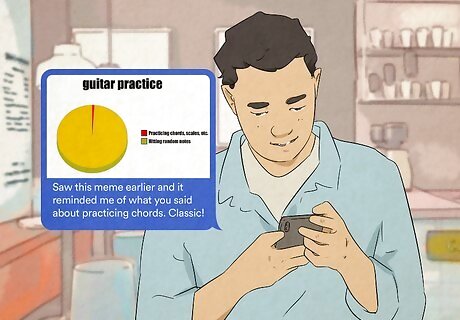
GIFs and memes give you an opportunity to let your personality shine. It's hard to be humorous through text alone, especially if you tend to be more sarcastic or dry. Provided the platform allows you to share them in messages, use GIFs and memes to help convey your humorous side. If the person has mentioned any of their favorite movies or TV shows, they'll get a kick out of a GIF that features a scene from one of those. Memes also work as follow-up messages. If you see one that makes you think of the person, send it to them with a brief note about how it made you think of them. For example, you might say, "Saw this meme earlier and it reminded me of what you said about practicing chords. Classic!"
Ask open-ended questions to keep the conversation balanced.
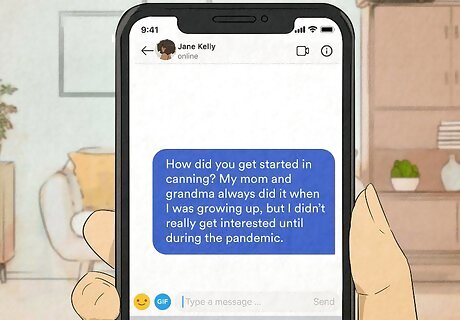
Open-ended questions tend to get a longer response. The key here is to make your question detailed enough that the person will actually respond with something interesting. Then, you can use their response to come up with other questions to ask them. For example, suppose you sent a message to a stranger complimenting their guitar playing skills and asking them who their favorite guitarists are. When they write back and tell you, you might ask if they've ever seen them in concert. You can also share any personal stories you might have that relate to whatever you're talking about. For example, if you saw their favorite guitarist in concert, you might tell a brief story about the show, then ask if they've ever seen them play live. It's also good to ask the person about their background or how they got started in a hobby or interest. For example, you might say, "How did you get started in canning? My mom and grandma always did it when I was growing up, but I didn't really get interested until during the pandemic."
Share something that made you think of them.

Passing on an article or post shows they're on your mind. If you see something that reminds you of the person or a conversation you've had recently, don't hesitate to share it with them. Add a note mentioning that you instantly thought of them when you saw it and thought they might like it. For example, you might say, "Hey, I saw this article about how music affects our brains and I instantly thought of you. Here's scientific proof that what you were saying was true—music really can calm people down!" You might suggest other accounts to follow as well. For example, you might say, "Have you seen the Yoopcyclers page? They're partners in Michigan who transform old bookcases into works of art. With what you can do with coffee tables, I thought you'd really appreciate their work."
Follow the platform's basic norms.
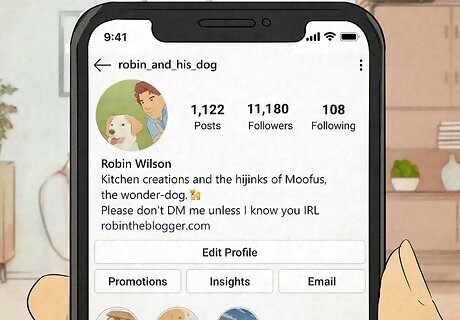
Private messages from strangers aren't welcome in some networks. If you're on a dating app or website, private messages from strangers come with the territory—people are there to meet new people. But on social media, many people are only there to share things with people they already know. For example, random DMs from strangers on Instagram, Facebook, or Twitter are usually unwelcome and will probably be ignored. A possible exception might be if the person is using those platforms to promote their business and you want to reach out to them about something business-related. LinkedIn is a platform where messages from strangers are encouraged if they relate to the person's work or career. But if you want to send someone a personal message, LinkedIn is not the best place. Check the person's profile as well. They might say something about private messages—and if they do, respect it. For example, if someone's profile says, "Please don't DM me unless I know you IRL," then don't send them a message.
Vet the person as best you can before you contact them.

Make sure the person is who they say they are. This is especially important if you think you might be interested in the person romantically—but even if you're not, you don't want to talk to someone with a made-up identity. Here are some things you can do to figure out if they're legit: Do a reverse-image search of their photos to see if they're elsewhere online. Check for friends or followers that also follow each other (this shows a group of friends) or connections to family members. Look for comments that seem to come from people who know them IRL. Search their full name online (if you have it) and see what comes up. Ask any mutual friends or followers about them.
Protect your privacy until you know the person well.

Don't share personal information until you get to know the person better. Even if the conversation is going well, the person is still a stranger. You have no way of knowing their true intentions, and they could use your personal information to harm you. Be careful with sharing photos of yourself as well. Generally, it's best to only share photos with someone you don't know in person that you would happily share on your social media. If they ask you a question that you don't feel comfortable asking, you might say, "I'd prefer not to answer that right now." You could also say, "I'm sorry, that's a little too personal for me at this point. I'm sure you understand." Someone who keeps asking you personal questions or pressuring you to give them information might not have your best interests at heart. It's usually a good idea to stop talking to them—block their account if they won't leave you alone.


















Comments
0 comment